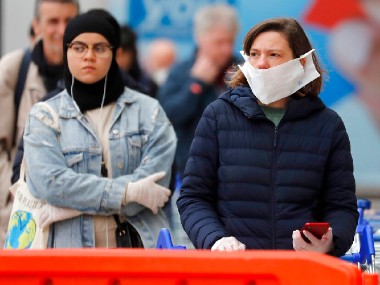Editor’s Note: Thousands of Indians are stranded in foreign lands across the world, some by choice, others due to geopolitical, financial and academic constraints. In this **multi-part series** , Firstpost takes a look at how they are managing through the lockdown due to the coronavirus pandemic
***
Twenty-five-year-old Shyamali, who lives in Berlin, Germany, calls her parents in Ludhiana, Punjab, every day to keep them updated with genuine COVID-19 information rather than let them being swayed by viral and unfounded WhatsApp forwards. Her family has been very careful especially after the
first case emerged in Punjab on 19 March 2020. “My parents have lived through the Emergency of 1984. That’s why while talking about the current lockdown to them I try not to trigger their trauma," she says. Shyamali informs that one her uncles died during the 2009-10 swine flu pandemic, and having lived through it is working in their favour since the symptoms and precautions (of swine flu and COVID-19) are similar. “Since, my parents went through the swine flu ordeal, they know how to disinfect surfaces and touch points. They know the drill,” she says. [caption id=“attachment_8272441” align=“alignnone” width=“825”] Shyamali’s work desk in Berlin, Germany. Image courtesy: Shyamali[/caption] Germany is currently capable of testing
5,00,000 people in a week with the least number of critical cases and many empty ICUs. Since every person with the symptoms is not being treated – unless there has been direct contact with an infected person or one has travel history to one of the COVID-19 infected countries – employees are exempted from showing up to work if they have
mild respiratory disease, hence, helping curb the spread of the disease. However, language proves to be a barrier when accessing the healthcare in Germany for non-German speakers. “One of the problems I face here while accessing the healthcare is that the doctors mostly do not speak English and I have fundamental knowledge of German, which sometimes is not enough. That makes it a bit difficult to access the facility. I just wish they would learn to speak English so it is easy to communicate with the foreigners,” she says. While people across a broad spectrum are affected by the COVID-19 pandemic, globally, it is the poor who are categorically left out of the conversations on COVID-19. In India, the
mass exodus of migrant labourers in various cities is a
massive oversight and shows a
lack of coordination between state governments and the Central Government. Without a systematic support to keep themselves abreast of latest updates, it is uncertain how the virus will impact different demographics, especially those who are poor, undernourished and without resources to self-isolate. Pranshu Upadhyay (28), a consulting engineer in Rome, Italy, notes this about his city Monteverde: “Mostly people cooperated since the initial stage. However, some people did not pay heed to the rules and did not take them seriously. They were mostly poor people.” [caption id=“attachment_8272451” align=“alignnone” width=“825”]
It took some time for people in Rome, Italy, to wrap their head around the coronavirus pandemic . Image courtesy: Pranshu Upadhyay[/caption] However, it is not just the poor alone who are taking time to wrap their head around the long-lasting consequences COVID-19 can have on the world. “I don’t think I realised the gravity of the pandemic since the situation here was relatively better than
Northern Italy. People did panic a bit initially – wondering how a lockdown would be and guessing if the supplies would be available. But they are available now. Plus, strict norms are being set by the authority to maintain social-distancing,” adds Upadhyay. Twenty-eight-year-old Visvak, who is doing MA at SOAS University in London said that healthcare is available to all in the UK via the National Health Service which is funded out of general taxation. “Everyone gets it via student and work visas and it is a good amount. But right now because of COVID-19, NHS is overwhelmed and is not able to handle the number of cases. One person in my flat was ill for almost two weeks and we contacted the NHS two or three times but they told her to self-isolate. This was difficult since we all share the kitchen in dormitory. This put everyone else at risk. Luckily, she recovered a couple of weeks back and it was just a seasonal sickness,” he informs. [caption id=“attachment_8272431” align=“alignnone” width=“825”]
Representational image. AP[/caption] Abhijit Banare (27), an MPhil student of public policy at University of Cambridge said that the students at the University were emailed helpline numbers, email ids and cell phone numbers to be used in case of emergency. “If there are any symptoms, one would have to call the college administration so that they know the possible isolation cases. They would then coordinate with the NHS. An email id is dedicated to advisories and day-to-day updates and suggestions,” he informs.


)

)
)
)
)
)
)
)
)



